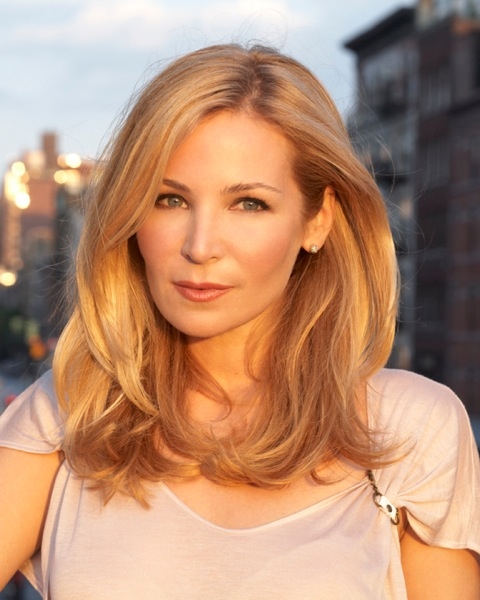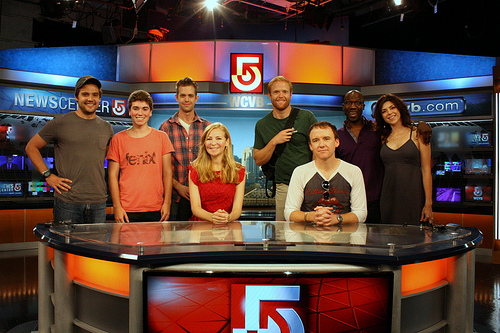Jennifer Westfeldt on Religion, Relationships, and The Power of Duff at the Huntington Theatre Company

Tony-nominated actress, screenwriter, and film director Jennifer Westfeldt has proven herself to be one of the most multifaceted artists in show business, finding success both onstage and on screen. While gaining notoriety for such films as Kissing Jessica Stein and her most recent independent project Friends With Kids — which she wrote, produced, directed, and performed in alongside longtime partner Jon Hamm — Westfeldt has managed to perform in dozens of off-Broadway and regional productions, picking up a Tony nomination along the way for her role in the 2003 revival of Wonderful Town.
Following up her run in the Manhattan Theatre Club production of The Explorers Club this past summer, Westfeldt is continuing her East Coast stay, joining the Huntington Theatre Company in Boston for a production of Stephen Belber’s The Power of Duff. The play follows a television newscaster, Charlie Duff (David Wilson Barnes), who unknowingly inspires acts of good among his viewers after he begins closing his nightly broadcasts with a prayer. Westfeldt plays Duff’s co-anchor, Sue Raspell, who sternly opposes the new ritual on the grounds of journalistic integrity. The actress shared her own stance on this conflict between religion and journalism, while offering TheaterMania some insight into her bicoastal lifestyle and the most recent bout of homesickness that brought her back to the stage.
Controversial questions about religion and spirituality are a central focus of The Power of Duff. Has this spurred a lot of conversation and debate among the cast in rehearsals?
Yeah, and outside of rehearsal too. It’s obviously a hot-button issue for many people. There are a lot of perspectives in [the play]. I think that it’s asking the big questions and I hope that it sparks debate on spirituality, on whether or not there’s a God, on connectivity and how we’re all living, and if we’re living deliberately. Sue has this beautiful speech in the second act and it’s been cathartic to play this character who is tightly wound and not living life the way she wants to be. It’s [also] interesting for me because my sister is a journalist. The conflict between journalistic integrity and what’s happening in this play on the airwaves is of interest too.
How do you personally feel the line between religion and journalism should be drawn?
I think, not unlike my character, I come down on the side of journalistic integrity and journalism being pure and fact-based.
Do religion or prayer play any role in your own life?
Not in any traditional sense, no. I think I’d be closest to a humanist bent rather than any belief in organized religion. That’s sort of where I fall in my own life thus far.
One of the things that drives the main character is a desire to connect with people in a way he hasn’t in the past. How do you maintain your connections with people?
It’s always a little bit distant because I’m always living in different places. It’s tricky — you just try to make the most of the time you have with your people and that’s always been a priority for me. One-on-one connection with family or friends or colleagues becomes more precious and also sometimes more elusive because everybody’s scattered to the four winds. Especially in this field.

You recently finished your run in The Explorers Club at MTC. Is it just a coincidence that your career is theater-centric right now or are you consciously focusing on stage work?
It was a conscious decision on my part. I spent a solid two years on my last film just because I had to wear so many hats…I think that when you work on a single project for so long and you’re kind of 24/7 on it, you miss so many opportunities and have to turn down so many opportunities to work as an actor. I think I just missed the daily acting work. The getting to do eight shows a week feels very active and vital. There’s so much surrounding an independent film project from a producing standpoint [and] a directing standpoint, that the actual shooting of it, which is the most fun, ends up being the smallest amount of time you spend on a project. [I] realized just how much I’ve missed the theater. It’s something that’s always meant so much to me and I’ve been trying to get back to it at least once or twice a year to do a play.
Do you think you’ll stick around for a while longer or do you have plans to go back to the West Coast?
We’ll see sort of how the rest of the year pans out. There are a few things brewing and it’s always about lining up my life with Jon [Hamm, Wesfeldt’s partner] to work together as much as possible, and also signing [onto] a project that inspires me.
Have you and Jon ever talked about a play you’d like to do together?
We haven’t had that conversation exactly. We may. Right now he’s on vocal rest and can’t speak, so we’ll have to table that. [laughs]











